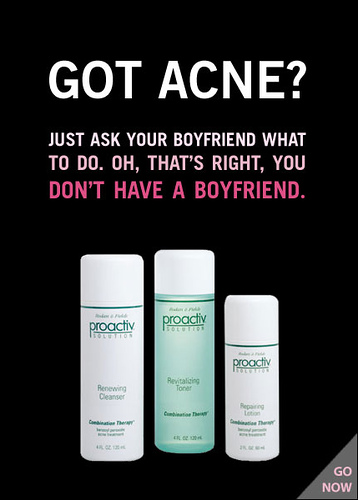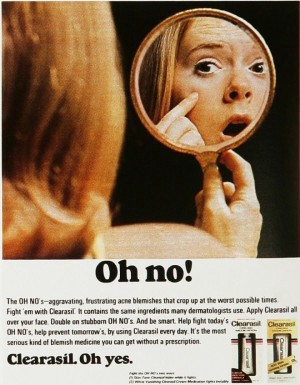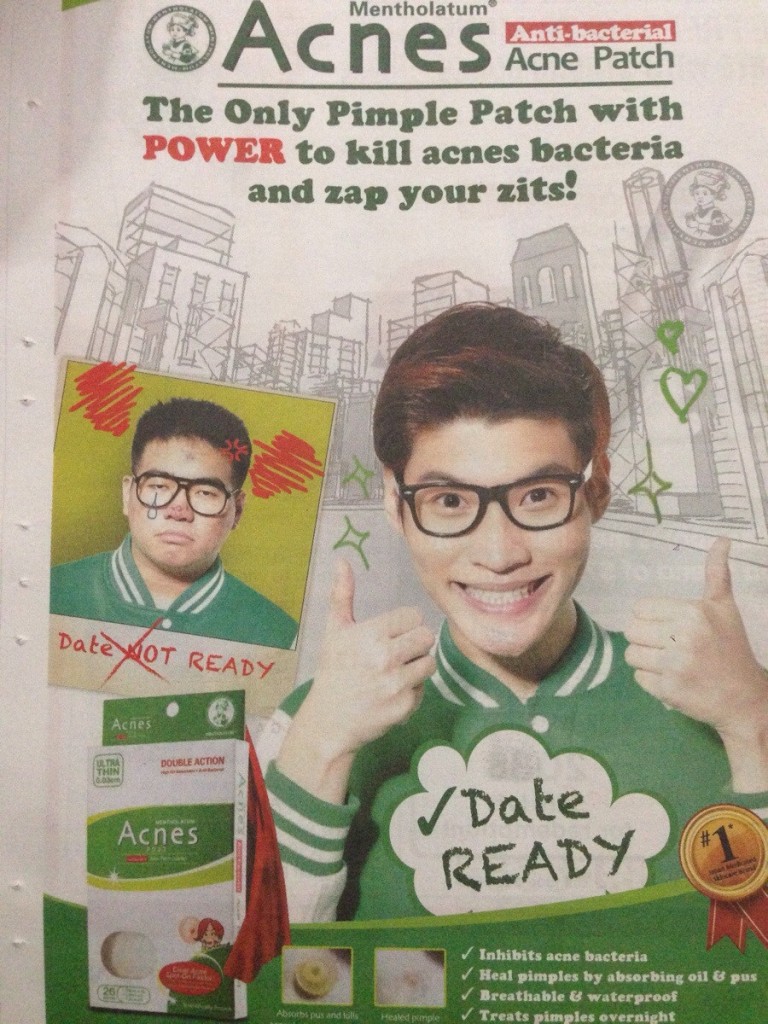Feb 032019
Introduce Your Genre
- Identify your tentative “underappreciated” genre (or subgenre)
- Acne Product Commercials/Advertisements
- What is interesting to you about this genre? Or, why might it be significant or otherwise worth paying attention to?
- It’s interesting how most of these ads/commercials will use a celebrity to sell the product. And also how they’ll show how the acne product has worked for other people even though you can tell the people in the advertisement or in the commercial have make-up on. So, how do you know if the product has actually worked for them?
- It’s worth paying attention to because it’s sold to viewers as in you’ll only be pretty if you’re skin is flawless and encourages people with acne to feel insecure about their looks.
- When really these ads/commercials need to encourage the importance of having healthy skin for more reasons than just meeting society’s standard for beauty.
- Tentatively, define/describe your corpus (collection of texts/examples)
- Commercials/Ads usually featuring a female teenager or young adult woman with acne problems. Men are also sometimes included.
- These people are usually talking about their “acne story” how they were super self-conscious and were too embarrassed by their skin. So, suddenly they try whatever over-priced skincare product that’s in the ad and suddenly their skin looks great within two weeks, 6 months etc.
- Some of these include before and after pictures.
- Some ads/commercials will include popular celebrities (kendall jenner, adam levine, justin bieber etc.) that are well-known among teenagers and young adults.
- Usually talks about how disgusting and embarrassing acne can be.
- These commercials/ads are basically all about how you’ll look better without acne and how you aren’t beautiful because you have some pimples on your face.
- A lot of the commercials/ads will be about how you can’t get a date because of acne. And so you need this super over-priced product with super harsh chemicals to help your skin.




- Provide links (and/or titles) of five samples. (Try to gather samples from more than one “place” [or type] in order to obtain a diverse and accurate representation of the genre. For now, choose samples without significant deviations).
https://www.youtube.com/watch?v=xoGoeT41onM
https://www.youtube.com/watch?v=BVwzc5ajdAg
https://www.youtube.com/watch?v=smPcFVKK8x0
https://www.youtube.com/watch?v=1KP5jpxTG0I
https://www.youtube.com/watch?v=bwJe8rjx9K8
Describe the Context
- Setting: Where (in what context or medium) does the genre appear? How and when is it used? With what other genres does this genre interact? How?
- Appears in commercials, print, advertisements, and social media.
- Used in beauty magazines or on TV channels that teenagers/young adults primarily watch. For example, proactive commercials would be shown during the viewing of American Idol and other shows like that.
- Sometimes it can interact with make-up tutorials because sometimes famous beauty gurus will be paid to advertise a product in one of their videos.
- It can also interact with reviews. Because people will write reviews of products.
- Subject: What topics, issues, ideas, etc. are common to this genre? When people use this genre, what are they communicating about?
- Topics: acne, dirty skin, bacteria, beauty, people’s physical flaws, vanity, low self-esteem, society’s standard of beauty, skin health
- It usually communicates the idea that external beauty is important.
- It communicates that taking care of your skin is important so you cannot have acne and still be considered “pretty.”
- When really it should communicate the importance of keeping your skin healthy.
- It communicates society’s ideal beauty standard.
- Writers: Who writes the texts in this genre? Are multiple writers possible? What roles do they perform? What characteristics must writers of this genre possess? Under what circumstances do writers write the genre (e.g., in teams, on a computer, in a rush, for their profession? For fun?)?
- A marketing team puts together commercials/advertisements for skin care brands.
- These commercials/advertisements are created & published online or shown on TV to get people with bad skin/acne to buy expensive skin care products that probably do more harm than good, honestly.
- It’s created for their profession – to sell over-priced acne products.
- Readers: Who reads the texts in this genre? Is there more than one type of reader for this genre? What roles do they perform? What characteristics must readers of this genre possess? Under what circumstances do readers read the genre (e.g., at their leisure, on the run, in waiting rooms)?
- People with acne or interested in beauty products come across this genre a lot.
- Targeted at insecure teenagers
- Targeted at adults still struggling with acne
- Men and women are in commercials and ads. However, I feel like I see more women than men used in these ads/commercials.
- Viewers will usually see these types of ads on TV, online, social media, in magazines in the store, and in specific places like a spa, beauty parlor or maybe a dermatologists office.
- There used to be a vending machine of proactive products at the Galleria Mall.
- Exigency/Purpose(s): Why do writers write this genre, and why do readers read it? What purposes does the genre fulfill for the people who use it?
- Creators purpose: Well the beauty/skincare industry make a lot of money off how making people feel like having acne is bad.
- Purpose: It informs the readers/viewers about the products they can use to make their skin better or look better and tries to get them to buy the product.

I love the idea of looking into these ads/commercials for acne products. Often times they are so exaggerated and simply just want to draw people in to buy their product. The ads never consider things like genetics, diet, lifestyle, etc. and simply tell you that by using their product your acne will vanish which is usually not the case. The products may help, but in the end all they want is for you to purchase it. I think this will be really interesting to look into.
I like your idea of skin care commercials. I personally always see them and wonder if that person really had such terrible skin to begin with or if they really were a bad case. I see you mention the celebrity aspect. As if some celebrity exclusively uses that cheap infomercial skin care and doesnt spend thousands on spa and facial type treatments. I think when i was younger i had tried one of the popular products and had not been that impressed with it myself. would be interesting to know how the example subjects were chosen and which end up making the cut for commercials.
Hey Jessica, I love where you’re going with your underappreciated genre. You point out the horrible beauty standards that our society holds over our heads, which leads the viewers to not accepting reality but what is falsely scripted on telivision. I completely agree when you say that this leads to some feeling insecure/ unwanted due to something that everyone goes through, which is completely normal. I think you should also shed some light on the side effects of these products or natural cleansing products.
I think the fact that these advertisements kind of combine the ideas that clear skin means you are beautiful and if you are considered outwardly beautiful than you will feel whole and happy. The commercials themselves seem so staged and insincere and it is almost as though this presentation of happiness is done in hyperbole. It is too good to be true and takes advantage of the fact that an acne-ridden teen may not naturally see that they are being taken advantage of. The companies know that our self-image is so important to us that we will forego our own research and common sense for a quick fix.
I think looking into the fantasy that acne tries to make people live up to in order to prey on the insecure in order to profit is an intriguing outlook on these advertisements. If I were you i would consider different types of insecurities that these commercials target. How many celebrities actually share these same insecurities that the commercials prey on? How many celebrities actually believe in these products? How effective are the products compared to the commercials advertisements on the product? I feel like there are alot of avenues to what can be explored and I am excited to see where you go with this.
This is an interesting topic because it’s been around with the development of social media, and how these “influencers” are selling skin care products to their audience. Another interesting aspect would be the celebrity testimonies that were common or can still be seen on the vending machines at malls and other locations.